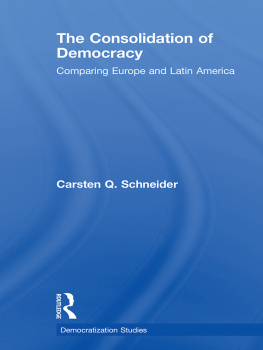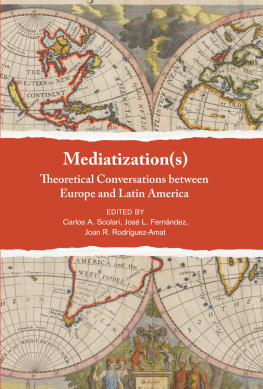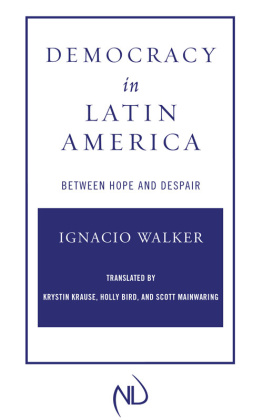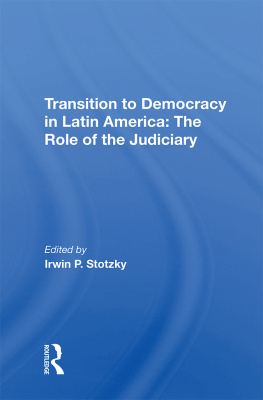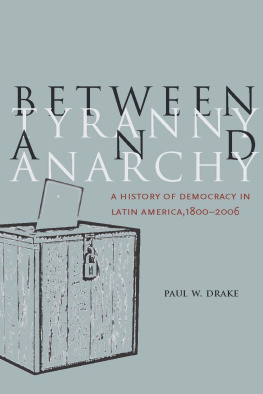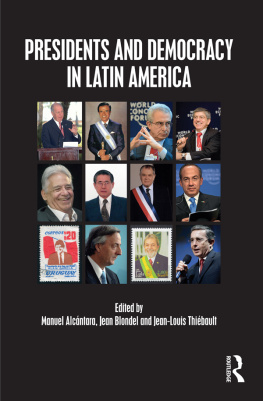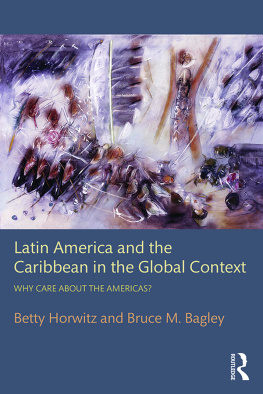The Consolidation of Democracy
This book investigates the successes and failures in consolidating those democratic regimes that emerged in Europe and Latin America in the last quarter of the twentieth century.
The theoretical approach developed combines the most prominent political institutional and sociostructural approaches to explaining the Consolidation of Democracy (CoD). Reinterpreting conventional claims, Schneiders comparative analyses of 32 countries indicates that the driving force behind CoD is the fit between the institutional type of democracy and the societal context in terms of power dispersion. This book:
- presents new data measuring dimensions of regime transition processes in Latin America, the Middle East and Northern Africa, as well as some former Soviet Republics;
- reassesses some core assumptions of the dominant transition paradigm;
- discusses general methodological issues involved when investigating causally complex claims in comparative social research and presents fuzzy set Qualitative Comparative Analysis (fsQCA) as a valuable addition to the methodological tool kit of comparative social scientists.
This innovative and important volume will be of interest to political scientists, particularly those with an interest in democracy, democratization, comparative politics, and social science methodology.
Carsten Q. Schneider is Associate Professor and Founding Director of the Center for the Study of Imperfections in Democracy (DISC) at the Central European University (CEU), Budapest, Hungary.
The Consolidation of Democracy
Comparing Europe and Latin America
Carsten Q. Schneider
First published 2009
by Routledge
2 Park Square Milton Park Abingdon Oxon OX14 4RN
Simultaneously published in the USA and Canada
by Routledge
270 Madison Avenue, New York, NY 10016
Routledge is an imprint of the Taylor & Francis Group, an informa business
This edition published in the Taylor & Francis e-Library, 2008.
To purchase your own copy of this or any of Taylor & Francis or Routledges collection of thousands of eBooks please go to www.eBookstore.tandf.co.uk.
2009 Carsten Q. Schneider
All rights reserved. No part of this book may be reprinted or reproduced or utilised in any form or by any electronic, mechanical, or other means, now known or hereafter invented, including photocopying and recording, or in any information storage or retrieval system, without permission in writing from the publishers.
British Library Cataloguing in Publication Data
A catalogue record for this book is available from the British Library
Library of Congress Cataloging in Publication Data
Schneider, Carsten Q., 1972
The consolidation of democracy: comparing Europe and Latin America/Carsten Q. Schneider.
p.cm. (democratization studies; 14)
Includes bibliographical references and index
1. DemocratizationEurope. 2. DemocratizationLatin America. 3. DemocracyEurope. 4. DemocracyLatin America. 5. Comparative government. I. Title
JN40.S36 2008
320.94dc22 2008023481
ISBN 0-203-88677-1 Master e-book ISBN
ISBN 10: 0-415-46806-X (hbk)
ISBN 10: 0-203-88677-1 (ebk)
ISBN 13: 978-0-415-46806-0 (hbk)
ISBN 13: 978-0-203-88677-9 (ebk)
List of figures
Causal chain of social dimensions leading to CoD
LoA items in Southern Europe
LoA items in South America
LoA items in Central America
LoA items in Central and Eastern Europe
LoA items in former Soviet Republics
LoA items in Middle East and Northern Africa
LoA score in year of founding elections
Development of LoA in Southern Europe, 19742000
Development of LoA in South America, 19742000
Development of LoA in Central America, 19742000
Development of LoA in Central and Eastern Europe, 19742000
Development of LoA in former Soviet Republics, 19742000
Development of LoA in Middle East and Northern Africa, 19742000
Development of CoD in Southern Europe, 19742000
Development of CoD in South America, 19742000
Development of CoD in Central America, 19742000
Development of CoD in Central and Eastern Europe, 19742000
Development of CoD in Former Soviet Republics, 19742000
Development of CoD in five world regions, 19742000
Index of CoD (19742000)
Fit of power dispersion between contexts and democracy type: theoretical expectations
Calibration function for membership scores in fuzzy set socioeconomically developed societies based on GDP
Example of x-y plot
x-y plot solution term for CoD
x-y plot solution term for not-CoD
Fit of power dispersion between contexts and democracy type: empirical findings
x-y plot Mongolias path towards CoD
Expected distribution of cases under pact hypothesis 2 x 2 table
Test of pact hypothesis 2 x 2 table
Link between parsimony, complexity, consistency, and coverage of solution terms
Number of logical remainders in one- and two-step QCA approaches
Juxtaposing correlational and set-theoretic approach to testing the pact hypothesis
List of tables
Indicators of CoD
The seven LoA items
Power dispersion typology of democratic systems
Hypothetical truth table
Fuzzy set membership scores in remote and proximate conditions and the outcome
Necessity test for CoD and not-CoD, remote and proximate conditions and their negations
Sufficiency test of remote conditions for CoD
Consistency and coverage solution of CoD-enhancing remote conditions
Power dispersion typology of societal contexts
Power dispersion typology of democracy types
Sufficient paths towards CoD and not-CoD
Liberalization of autocracy (LoA) annual scores, 19741999/2000
Consolidation of democracy (CoD) annual scores, 19741999/2000
Calibration of fuzzy set membership scores in conditions and outcome
Fuzzy set membership scores in sufficient paths towards CoD
Fuzzy set membership scores in sufficient paths towards not-CoD
Linguistic qualifiers for different fuzzy-sets
Cronbachs alpha, CoD and LoA (base: all years)
Cronbachs alpha, CoD and LoA (base: different points in time)
Regressions models, dependent variable CoD
Preface and acknowledgements
In the early 1990s, just after my civilian service and before starting university, I had decided to spend my first own money traveling for half a year through South America. Despite the many pleasant distractions one certainly finds there, it struck me how different political life was compared with what I was used to in West Germany, my home country in the 1980s. In Chile, ex-dictator General Pinochet still heavily influenced political life. In Argentina, President Menem set out to change the constitution in order to gain himself a third term in office, despite widespread rumors of large scale corruption partly fueled by stories about the president occasionally cruising the city with his red Ferrari. Brazil was in the midst of hyper-inflation while Argentina had pegged the peso to the US dollar, transforming me from a poor to a wealthy person every time I crossed the border from Argentina to Brazil with my few dollar notes and a poor person again when coming back to Buenos Aires. These were exciting places compared to the boring political scene of the Bonner republic, which in those years always saw the same man winning every national election. I found it difficult to imagine Helmut Kohl in a Ferrari speeding through the streets of Bonn. All this made me start wondering why these glaring differences were there. In the second half of the 1990s I moved to Spain, another young democracy, and studied political science. It was there that I got my hands on a Spanish version of Guillermo ODonnells passionate critique on the concept of the consolidation of democracy. Back in Germany, during my time as a research assistant at the Social Science Center (WZB) in Berlin, I started trying to figure out in a more structured way how, despite ODonnells disillusionment with the then current consolidation literature, one can nevertheless say more about why democracy in some countries is becoming the norm while in others it is not. This question turned into my dissertation project which got its final shape while I was a doctoral student at the European University Institute (EUI) in Florence.

